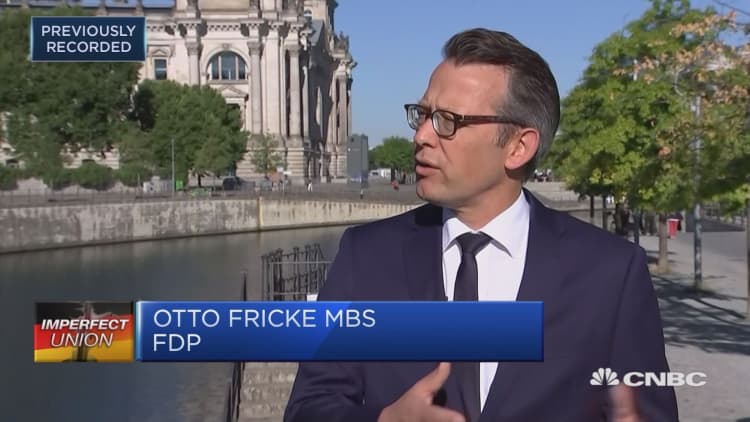The German coalition government has been salvaged after Chancellor Angela Merkel reached a compromise with interior minister and the leader of the Christian Social Union (CSU), Horst Seehofer, ending a bitter standoff over immigration.
A political crisis was avoided Monday evening when Seehofer dropped his threat to resign after hours of talks with Merkel. The leader of the CSU, the Bavarian sister party of the Christian Democratic Union (CDU), said the two leaders had agreed on how to prevent illegal immigration between Germany and Austria.

The deal’s details, reported by Deutsche Welle, involves a “new border regime” that will prevent asylum seekers entering Germany whose “asylum procedures are the responsibility of other EU nations." It also requires transit centers for migrants at the border. It was also reported that in cases where such agreements cannot be reached, they would nevertheless be rejected "on the basis of an agreement with the Republic of Austria."
However, Austria said Tuesday that it was prepared to take measures for the protection of its own southern borders if the German coalition deal goes into force, Reuters reported. Austria’s statement did not go into any more detail but has piqued curiosity given that it borders Italy and Slovenia to the south.
The CSU partners Merkel’s Christian Democratic Union (CDU) in a governing coalition with the Social Democratic Party (SPD). If Seehofer had resigned it would have put Merkel in a difficult position and raised the possibility of another election, just months after the last one in September.
The deal is not yet finalized however, with the CDU and CSU meeting with their junior coalition partner on Tuesday, the Social Democrats, which has to agree to the arrangement.
Merkel said the pair had "reached a good compromise" after days of difficult negotiations. Seehofer said, meanwhile, that the agreement was “sustainable” and matched his “convictions,” and had allowed him to stay as head of the Interior Ministry.
Peter Beyer, a member of parliament and the CDU’s official commissioner for trans-Atlantic relations, told CNBC his party was glad to see an end to what he called the "crisis" and "internal conflict." He felt the SPD would agree to the deal.
"Is this the end of the conflict? Yes, but of course now it needs a lot of negotiation with our neighboring countries, with our partners within the European Union and then what has been negotiated will then have to be implemented."
Seehofer’s threat to resign over migration has been seen by analysts as electioneering ahead of Bavarian state elections in October. The party is keen to be seen as tough on migration, a concern among many voters, and to stop the rise of the anti-immigration Alternative for Germany (AfD) party.
Otto Fricke, a member of the German parliament (Bundestag) and budgetary spokesman for the Free Democratic Party (FDP) told CNBC that Seehofer would know now that he could maneuver his coalition partner Merkel.
“Seehofer now does know that, in the end, he can get Merkel in certain positions, which doesn’t mean that Merkel is in the end of her career, but I think she’s harmed (by this experience),” Fricke told CNBC's Willem Marx in Berlin on Tuesday.

The deal will allow Seehofer to show voters in Bavaria, in southern Germany, that he is doing something to try to manage migration to the country. The FDP’s Fricke didn’t think the plan was viable, however.
“I don’t think it will be workable because we’re just talking about the border between Bavaria in southeastern Germany and Austria. We’re not talking about the border between North Rhine-Westphalia, the largest state in Germany, and Belgium and the Netherlands where we do see more and more migrants coming in,” he said.
Germany has to accept “that it is a migration country and that it has to decide whom to keep and whom to send out,” Fricke added.


